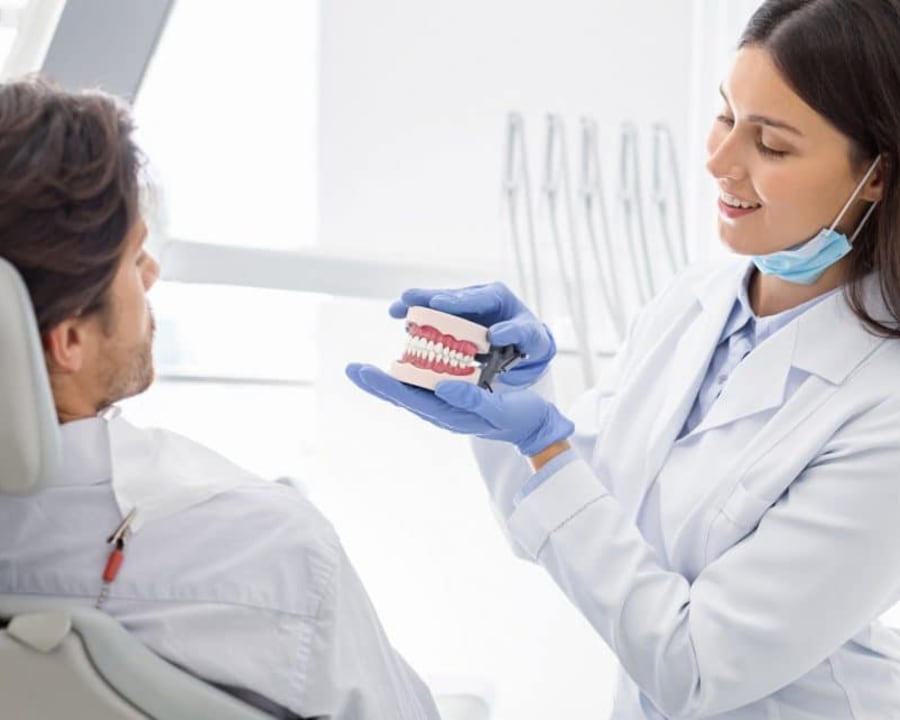What is a Dental Bridge?
A dental bridge fills the space left by missing teeth. It typically consists of two crowns on either side of the gap, with one or more artificial teeth (pontics) in between. The crowns are placed over adjacent natural teeth to anchor the bridge in place.
For an alternative approach, dental implants can be used to support the bridge. Implants are small titanium posts surgically placed into the jawbone, providing a secure foundation for the restoration. This method eliminates the need to alter adjacent healthy teeth for crown placement.
Although bridges can be made using metal or porcelain fused to metal, we prefer all-porcelain bridges for their durability and natural look. Modern dental porcelain blends seamlessly with your natural teeth, resulting in a beautiful, fully functional smile.
Dr. Weiss will perform a full assessment during your consultation and help you choose the right support method – crowns or implants-based on your oral health and goals.

Are You Missing a Tooth?
Missing teeth can make it difficult to chew, eat, speak clearly, and smile with confidence. If you’re missing one or more teeth, we can help restore both the function and appearance of your smile with a custom dental bridge.
Combining Aesthetics with Function
If crowns are used to support the bridge, the procedure usually takes two appointments:
- Appointment 1: The adjacent teeth are prepared for crowns, and impressions are taken to craft your custom bridge. A temporary bridge may be placed at this time.
- Appointment 2: Your permanent bridge is bonded into place for a secure, comfortable fit.
If you opt for an implant-supported bridge, the process is longer but more permanent. It includes:
- Two surgical procedures to place the implants, spaced four to six months apart for healing.
- Impressions and fabrication of your custom bridge once the implants have fully integrated.
Questions about dental bridges?
Browse through our answers to common questions about dental bridges.
-
How long does it take to get a dental bridge?
The process typically takes a few weeks and involves multiple appointments. Your dentist will first evaluate your needs and create a treatment plan.
Then, the supporting teeth are prepared, impressions are taken, and a temporary bridge is placed while your permanent bridge is being made in a dental lab.
-
Will my natural teeth need to be modified for a dental bridge?
Yes, in most cases, the teeth next to the gap –called abutment teeth will need to be reshaped to support the bridge. This process typically involves reducing and contouring the teeth to ensure a stable, secure fit.
The extent of modification depends on the type of bridge, the condition of your teeth, and your personalized treatment plan. The goal is to create a strong, properly aligned foundation for your bridge that looks natural and functions well.
-
Can I still floss and brush my teeth with a dental bridge?
Yes, you can continue to brush and floss regularly with a dental bridge. Good oral hygiene is essential to keep your natural teeth, gums, and the bridge itself healthy.
Be sure to clean under the bridge and around the abutment teeth using floss threaders, interdental brushes, or other tools recommended by your dentist. Consistent brushing, flossing, and routine dental visits will help prevent decay, gum disease, and ensure the long-term success of your bridge.
-
Can a dental bridge be repaired if it’s damaged?
Yes, a dental bridge can be repaired if it gets damaged, depending on the extent and nature of the damage. The specific repair options will vary based on factors such as the type of dental bridge, the material used, and the location and severity of the damage.
It’s important to note that the potential for repair depends on the individual circumstances, the condition of the bridge, and the underlying supporting structures. In some instances, a severely damaged bridge may require replacement with a new bridge. Promptly contacting your dentist if you notice any damage or issues with your dental bridge is crucial, as early intervention can increase the likelihood of successful repairs.
Remember to consult with your dentist for an accurate assessment of your specific case and to explore the available options for repairing a damaged dental bridge.
-
Will my insurance cover dental implants?
Insurance coverage can vary greatly between providers and plans.
To determine what part, if any, of your dental implant treatment will be covered by your insurance, check with your insurance provider.

